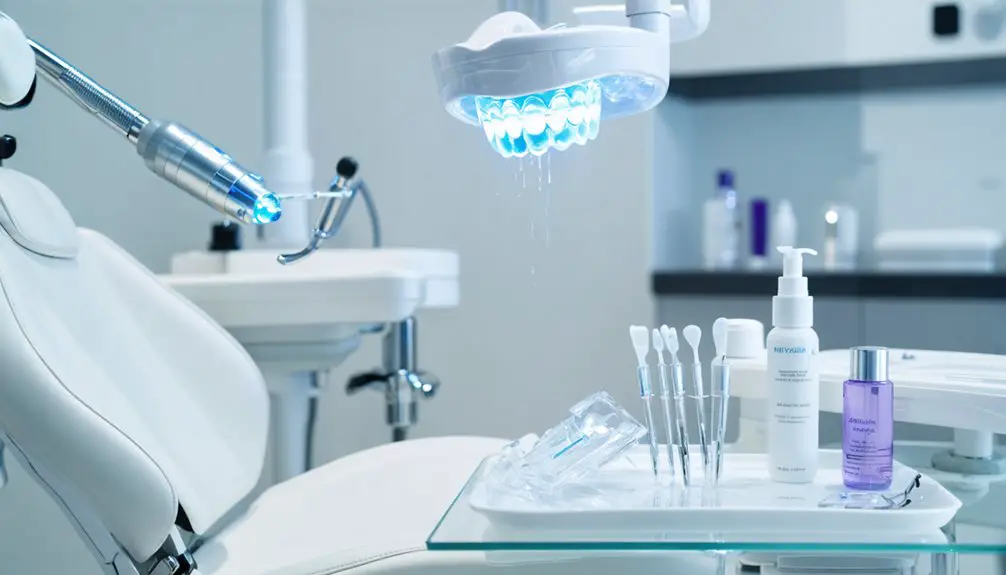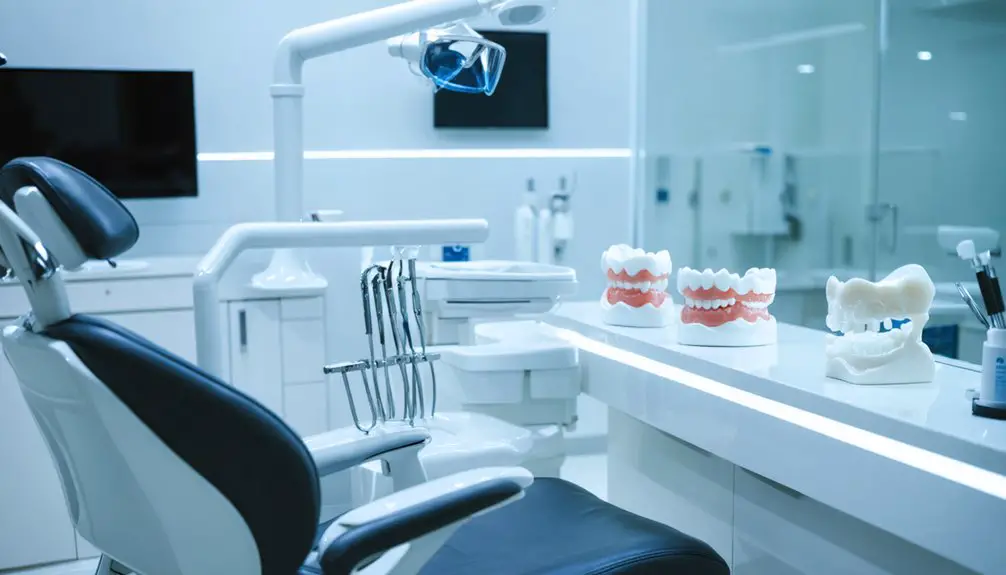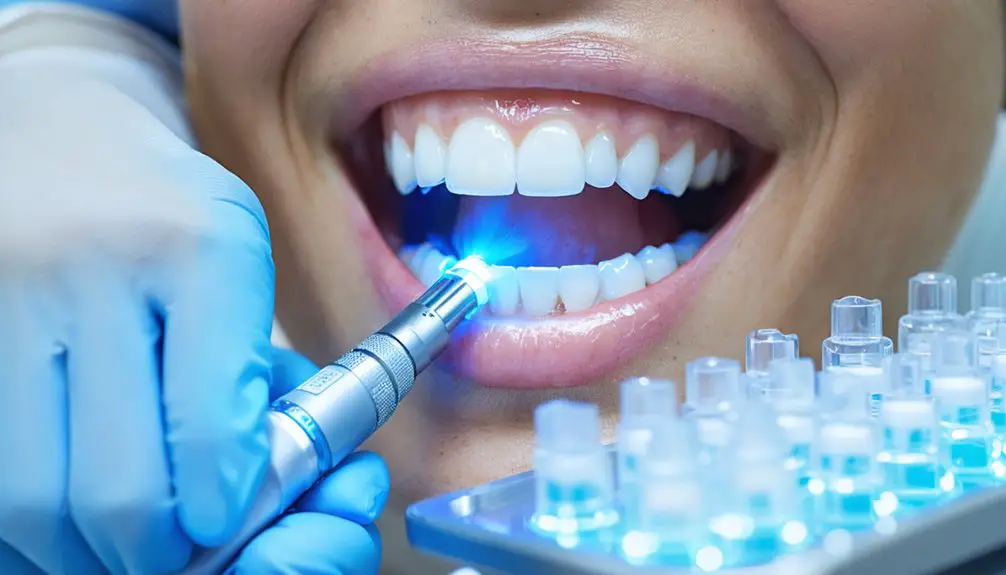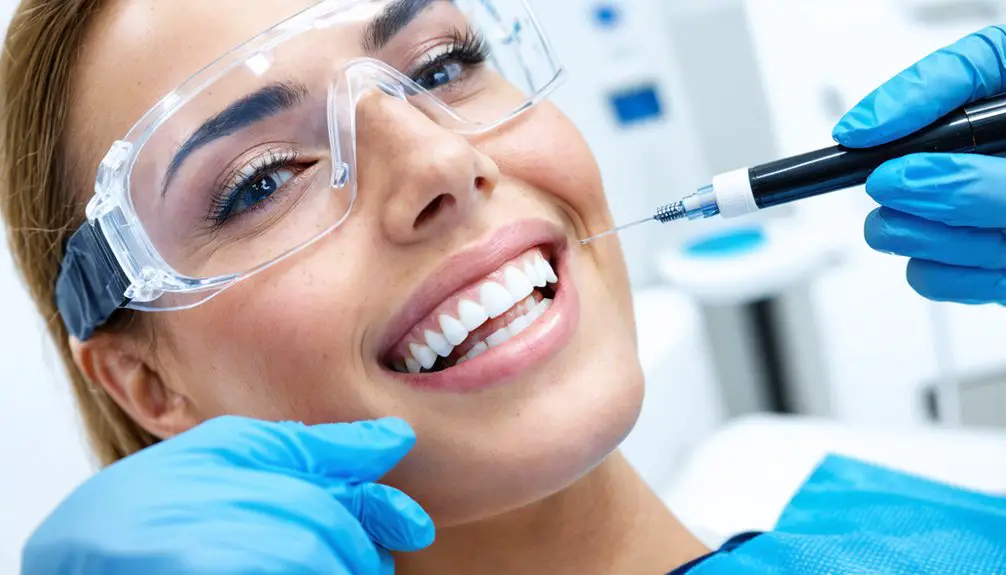You’ll achieve lasting laser teeth whitening results through three essential approaches. First, prepare properly by scheduling a dental consultation and maintaining strict oral hygiene before treatment. Second, follow post-procedure dietary restrictions by avoiding staining foods and beverages for 72 hours. Third, implement long-term maintenance with specialized whitening products and regular dental cleanings. Understanding the complete protocol will help you maximize your investment in a brighter smile.
Key Takeaways
- Follow strict pre-treatment preparation, including professional dental consultation and maintaining excellent oral hygiene before laser whitening.
- Adhere to dietary restrictions by avoiding staining foods and beverages for 72 hours post-treatment.
- Use specialized whitening toothpaste and gentle brushing techniques to maintain results without damaging enamel.
- Schedule regular dental cleanings every six months and follow dentist-recommended touch-up treatments.
- Minimize contact with staining agents by using straws for beverages and rinsing mouth immediately after consuming pigmented foods.
Pre-Treatment Preparation for Maximum Results
To achieve ideal results from laser teeth whitening, proper preparation is essential in the weeks leading up to your treatment.
Schedule a thorough dental consultation to assess your oral health, evaluate enamel thickness, and identify any issues that could affect the procedure’s success. You’ll need to maintain strict oral hygiene practices, including twice-daily brushing and flossing with sensitive-formulated products. Make sure to avoid using any whitening products beforehand as this can increase tooth sensitivity during treatment. Patients with dental caries must have them treated before proceeding with any whitening procedures.
Professional dental assessment and diligent oral care with specialized products are crucial first steps before laser teeth whitening treatment.
Follow specific dietary restrictions 24-48 hours before treatment by avoiding staining substances like coffee, tea, and red wine. You’ll also need to refrain from tobacco use and acidic foods that can compromise enamel integrity.
Schedule a professional cleaning before your session to remove debris and calculus. Stay well-hydrated and eat a balanced meal prior to your appointment, as you won’t be able to consume anything during the procedure.
Smart Lifestyle Changes During Recovery
Three critical lifestyle adjustments must be implemented during your laser whitening recovery period to protect and maximize results.
First, follow strict dietary restrictions by consuming only non-pigmented foods like white rice, plain yogurt, and chicken breast for 48-72 hours. You’ll need to avoid all staining beverages, including coffee, tea, and wine, while steering clear of acidic foods that can damage vulnerable enamel. Mac and cheese can be a satisfying meal option since it’s made with white cheese sauce that won’t stain.
Second, manage tooth sensitivity by avoiding extreme temperatures and waiting 30-60 minutes after acidic foods before brushing. Using specialized oral hygiene products specifically formulated for whitened teeth can help maintain brightness while protecting sensitive enamel.
Third, enhance your oral environment by staying hydrated and chewing sugar-free gum to boost saliva production.
When you do consume potentially staining substances after recovery, use a straw and rinse immediately with water to minimize contact with tooth surfaces.
Essential Long-Term Maintenance Strategies
While laser whitening can deliver dramatic initial results, maintaining that bright smile requires an extensive, long-term approach focused on four key areas: meticulous oral hygiene, dietary awareness, professional maintenance, and prevention of harmful habits.
You’ll need to brush twice daily with whitening toothpaste and floss regularly to protect your investment. Consider using desensitizing toothpaste if you experience any discomfort after treatment.
Make strategic dietary adjustments by limiting exposure to staining agents like coffee and red wine, using straws when possible, and rinsing immediately after consuming pigmented foods. Regular water rinsing helps minimize staining from foods and preserves your whitening results.
Schedule professional cleanings every six months, and follow your dentist’s recommended touch-up schedule for ideal results.
Don’t compromise your results with excessive DIY whitening treatments or aggressive brushing techniques that can damage enamel.
Instead, rely on dentist-approved maintenance methods and consistent oral hygiene practices to preserve your brightened smile.
Frequently Asked Questions
Can Laser Teeth Whitening Damage Existing Dental Work Like Crowns or Veneers?
While laser effects won’t damage properly made crowns or veneers, these dental materials won’t whiten like natural teeth. You’ll need protective barriers during treatment to safeguard restoration margins and surrounding tissues.
How Soon After Laser Whitening Can I Safely Undergo Other Dental Procedures?
You’ll need to wait at least two weeks after laser whitening before undergoing other dental procedures. Schedule a dental consultation to guarantee proper post treatment care and minimize sensitivity risks.
Is Laser Teeth Whitening Safe During Pregnancy or While Breastfeeding?
You shouldn’t undergo laser teeth whitening during pregnancy or while breastfeeding due to pregnancy precautions and breastfeeding considerations. Wait until after these periods to avoid potential risks to you and your baby.
Does Taking Certain Medications Affect the Success of Laser Teeth Whitening?
Yes, certain medications can greatly impact whitening effectiveness, especially antibiotics like tetracycline. You’ll need extended treatment times and specialized protocols to address medication-related stains for ideal results.
Can Repeated Laser Whitening Treatments Cause Permanent Changes to Tooth Enamel?
While 85% of patients experience temporary enamel sensitivity, you’ll risk permanent structural changes with repeated treatments. Long-term effects can include weakened enamel, increased porosity, and reduced protection against decay.
References
- https://artisticsmilesmiamidentist.com/blog/laser-teeth-whitening-vs-zoom/
- https://www.champaigndentalgroup.org/about-us/blog-articles/top-professional-teeth-whitening-techniques-2024-effective-safe
- https://www.expertdentalnyc.com/laser-teeth-whitening-vs-take-home-trays-which-option-is-right-for-you/
- https://www.culvercitydentist.com/blogs/teeth-whitening/laser-vs-zoom-whitening
- https://deandentalsolutions.com/discover-if-laser-teeth-whitening-is-right-for-you/
- https://www.hollywoodwhitening.com/en/blog/what-to-do-before-and-after-laser-teeth-whitening/
- https://www.cedarbrookdental.com/articles/what-to-do-before-teeth-whitening-treatment
- https://www.chattanoogadentalcenter.com/what-to-expect-before-your-first-professional-teeth-whitening-treatment/
- https://bloommedspamn.com/laser-teeth-whitening-guide-what-to-expect/
- https://www.bryantstdental.com/patient-education/steps-to-a-bright-healthy-smile-with-laser-teeth-whitening



